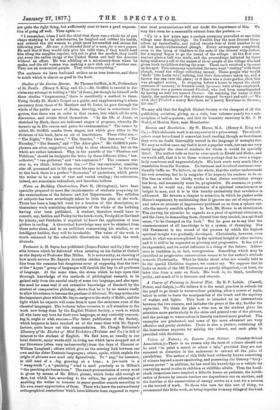Reason and Revelation. By W. Horne, M.A. (Henry S. King
and Co.)—This elaborate work is an expansion of a prize-essay. The adjudi- cators must have found it somewhat hard reading, though as Scotchmen they were no doubt thoroughly versed in the language of metaphysics. We may as well at once say that it is not a popular work, nor can one very easily imagine the class of students for whom it would be specially fitted. The author tells us that he owes much to Ewald and Rothe, and we would add, that it is to these writers perhaps that he owes a singu- larly cumbrous and ungraceful style. His book reads very much like a translation from the German. Its tortuous and involved sentences con- tinually baffle us. We believe, on the whole, that the author understands his own meaning, but he is sanguine if he expects his readers to do so. The line on which he chiefly works is that divine revelation always has been, and necessarily must be, progressive. He assumes, or postu- lates, as he would say, the existence of a spiritual consciousness or insight in man, and it is to this faculty exclusively that revelation is addressed. He devotes a chapter to miracles, in which he pushes aside Hume's argument, by maintaining that it ignores one set of experiences, and takes no account of impressions produced on us from a sphere out- side the merely sensible sphere. In fact, Mr. Horns is an intuitionist. The craving for miracles he regards as a proof of spiritual obtuseness, and the Jews, in demanding them, showed that they needed, in a spiritual sense, "to be thumped on the back." But he goes en to say that the commencement of all knowledge is by a system of thumping. The Old Testament is the record of the process by which the highest spiritual insight was gradually developed. Christianity, however, owes much to what was accomplished by the spiritual insight of other nations, and it is still to be regarded as growing and progressive. It has yet to be expounded, and its social influence is a thing of the future. Adher- ence to tradition ,is, in fact, retrogression. Something which may be described as progressive conservatism seems to be the author's attitude towards Christianity. What he thinks about what are usually held to be the special Christian dogmas, we cannot say. We suppose that he looks on much of the Old Testament as purely allegorical,—at least, we infer this from a note on Noah. His book is, we think, needlessly prolix, and much of it is tiresome and obscure.


































 Previous page
Previous page